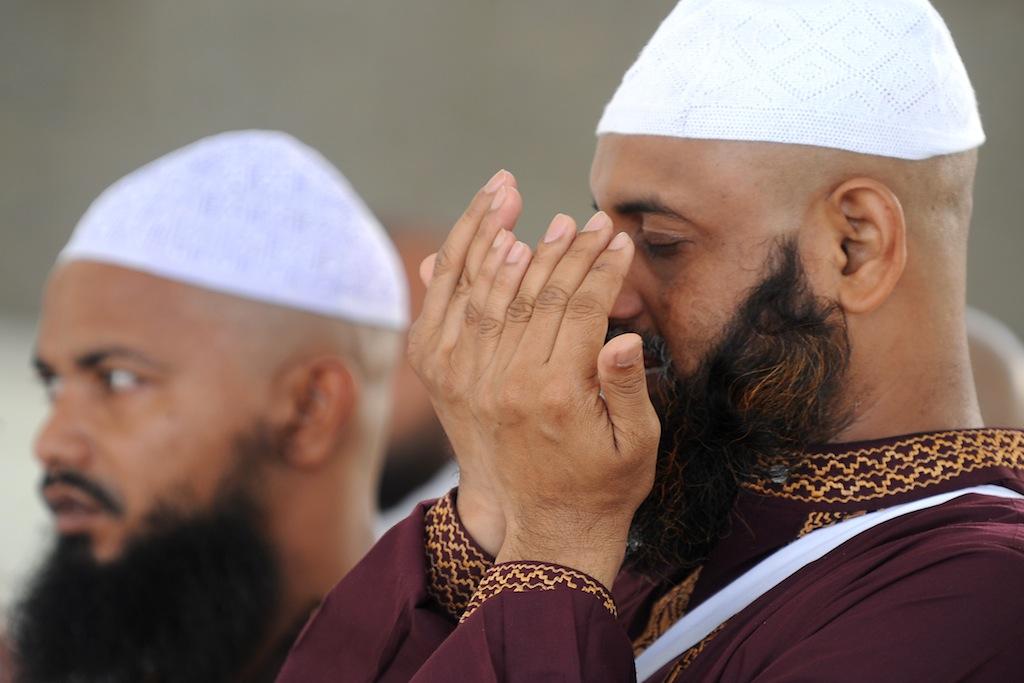Saudi Arabia is cracking down on atheism to suppress dissent
Muslim pilgrims pray to God after they threw pebbles at pillars during the 2nd day of “Jamarat” ritual, the stoning of Satan, in Mina near the holy city of Mecca, on October 16, 2013.
NEW YORK — Since Syria’s conflict began in 2011, a stream of jihadists militants has travelled from Saudi Arabia to join rebels fighting the regime of Bashar al Assad. Although travelling fighters are a Saudi tradition going back to the Soviet war in Afghanistan, the Saudi government worries that this time they may return home and take up arms against the monarchy.
So it was perhaps no surprise when the government this year criminalized the act of fighting in foreign conflicts, and named as “terrorist” several groups with which the Saudi jihadists identify: Hezbollah, the Muslim Brotherhood, and various factions of Al Qaeda.
What was surprising was the inclusion of another group on the “terrorist” list: Saudi atheists.
They were included to make the law politically palatable to the country’s right- wing fundamentalists. Gregory Gause, a Brookings Institution researcher who specializes in Gulf politics, said that members of Saudi Arabia’s religious right often accuse the regime of restricting them while allowing criticism from their liberal opponents – especially since the 9/11 terrorist attacks in the United States.
So when authorities designed this legislation to rein in right-wing extremists, Gause said they included atheism to give the message, “‘It’s not just you; we’re also cracking down on the evil secularists.’”
The law, issued on Feb. 1, defines terrorism as any act that could “harm public order” or “shake the security of society.” It was followed two days later by a royal decree criminalizing participation in “hostilities outside the kingdom.” But it wasn’t until March that an accompanying list of provisions was released to underscore specific groups considered terrorist – including, in the very first article, atheists.
Though no official figures have been reported, David Ottaway, a Middle East scholar at the Wilson Center, estimates that some 1,200 to 1,400 Saudi citizens have participated in the conflict. But he and others acknowledge that any statistics are little more than guesswork, given the clandestine nature of the jihadi warriors.
The phenomenon began in the 1980s, when both the Saudi government and the CIA encouraged Saudis to fight the Soviets in Afghanistan. Then they joined the Bosnian war, and later fought in Iraq – albeit without the government’s official support. In Syria, the Saudi monarchy has called for Assad’s ouster, but worries about a blowback if citizens get involved.
“The most serious challenges to the Saudi government have come from the religious extremist establishment, not from liberals,” said Ottaway.
Experts agree that atheists have virtually no presence in Saudi Arabia – certainly not a coherent or public movement. Nor do any closeted non-believers pose a threat to the regime. Joe Stork, the Middle East director at Human Rights Watch, described atheism in Saudi Arabia as “kind of a non-issue.”
“The purpose of the law and the regulations are basically to suppress dissent,” Stork said. “There are plenty of laws on the books that deal with terrorism,” he said, but this one is about restricting freedom of expression.
While international organizations like Stork’s have spoken out about the atheism regulation, however, there has been little public outcry within Saudi Arabia.
Most Saudis “don’t have that much exposure to ideas like secularism,” said Mohammed Aboud, a Saudi citizen who’s lived in the US for the past five years. “If they do have exposure to secularism it’s always painted in a negative light, so I would say to the vast majority of Saudis this would just seem like common sense.”
Aboud, a 36-year-old software developer who moved to California for his wife’s studies, is a self-proclaimed atheist. But that’s only online; in real life, nobody —not even his wife — knows about his beliefs. Because atheism is criminalized in Saudi Arabia, he asked that his name be changed in this article.
Despite the dangers, Aboud said he’s never had a problem living with his secret.
“It’s just something I’ve gotten used to hiding,” he said, and it didn’t factor into his decision to leave the country. He does not publicly voice his views — online, on Twitter, or anywhere else — so he does not feel threatened.
“The only reason I’m keeping this hush-hush is for the benefit of my family; I don’t want to break their hearts,” he said. “They’re all conservative Muslims.”
But Aboud believes there are other secret atheists in Saudi Arabia, and many more than most people would think. He said he often encounters anonymous non-believers online.
“We’re so closeted, we don’t actually meet each other,” he said. “But I’m pretty sure there are a lot of them.”
For now, Saudi “deviants” will continue to hide behind anonymity – or face the consequences – regardless of whether they’re Salafist, Shiite, Alawite, or atheist.
Portia Crowe is a student in international affairs at the Columbia Graduate School of Journalism.
Our coverage reaches millions each week, but only a small fraction of listeners contribute to sustain our program. We still need 224 more people to donate $100 or $10/monthly to unlock our $67,000 match. Will you help us get there today?
